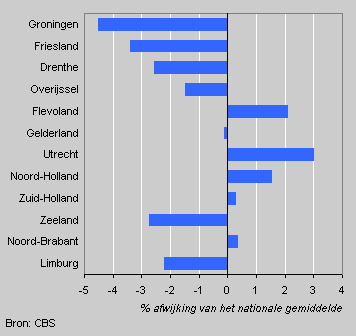Value added in wholesale trade 30 billion

In 2002 gross value added of the Dutch wholesale trade reached 30 billion euro. This is more than 7 percent of total value added of the Netherlands.
Biggest share of wholesale trade in Utrecht
In the province of Utrecht, wholesale trade contributed over 10 percent to the total value added of the province. This is over 3 percent above the national average. The other provinces where the share of wholesale trade was above average were Flevoland and North Holland. The share was considerably below average in Limburg, Zeeland and the northern provinces.
Share of wholesale trade in the value added per province, 2002

Wholesale trade in machinery is the largest branch
The wholesale trade in machinery had a value added of nearly 10 billion euro in 2002. This branch includes computers, office equipment, computer furniture and measuring and control devices.
The urban conglomerate of Amersfoort made the largest contribution with 10 percent of the total. This is followed by Amsterdam with 9 percent, the urban conglomerate of Utrecht with 7 percent, Rijnmond with 7 percent and urban conglomerate ’s-Hertogenbosch with 4 percent.
Other key wholesale branches
In terms of value added the wholesale trade in other consumer goods and the wholesale trade in intermediate goods are in second and third place with 7 and 6 billion euro respectively.
Wholesale trade in food, beverages and tobacco
The wholesale trade in food, beverages and tobacco also made a major contribution with almost 4 billion euro. The Rijnmond region had the largest share in this branch with 8 percent of the value added. Amsterdam follows with 6 percent, then the ‘s-Hertogenbosch conglomerate and De Veluwe with 5 percent each.
Value added wholesale trade by industrial class, 2002

Wholesale trade in agricultural products and live animals
The contribution of the wholesale trade in agricultural products and live animals contributed almost 2 billion euro in 2002. The companies are mainly located in the provinces North and South Holland, where key distribution hubs are located such as Schiphol airport and the ports of Rotterdam and Amsterdam. Moreover the action centres for flowers and horticultural products are located there. In Haarlemmermeer, the urban conglomerate Leiden and the Bollenstreek the focus is the wholesale trade in flowers, whereas the Delft and Westland have a sizeable wholesale trade in vegetables and fruit.
Paul Mangoenkarso and Bas de Vet